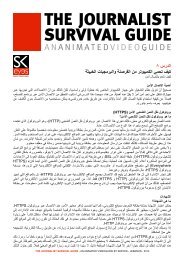JOURNALISTS' SECURITY IN WAR ZONES LESSONS FROM SYRIA
JOURNALISTS' SECURITY IN WAR ZONES LESSONS FROM SYRIA
JOURNALISTS' SECURITY IN WAR ZONES LESSONS FROM SYRIA
You also want an ePaper? Increase the reach of your titles
YUMPU automatically turns print PDFs into web optimized ePapers that Google loves.
Safety in the FieldCommunications and securityParticipants then discussed the topic of preferredworking procedures once journalists were insideSyrian territory. Some journalists like to workcompletely under the radar, without fixers andrelying on local connections. However, thisseems to have been the minority view. Others,particularly those working for more establishedoutlets, encouraged colleagues to plan the tripmeticulously and to have trusted contacts in eacharea they are planning to visit before they arrive.Though, it was pointed out that in some casesit is preferable not to fix a meeting but rathershow up, conduct interviews and leave as quicklyas possible afterwards. All journalists appearedto have some form of a communication plantailored to their own preferences and the realitieson the ground through which they would touchbase with a trusted contact at regular intervalsto update them and make it known that theyare safe.The discussion transitioned seamlessly to methodsof data protection. The key advice was to installTrueCrypt, a software that enables one to easilyhide data on computers. One of the most usefulfeatures of TrueCrypt for journalists reportingfrom conflict zones is the ‘Hidden Volume’feature, which enables the user to have twodifferent passwords with each password openingup a different set of data. Typically, one set ofdata includes sensitive content while the contentof the other is innocuous. In cases where a useris coerced into revealing his/her password, thatperson can give out the password which opens updata that is inoffensive. Software like TrueCryptis difficult to trace, even for those who are awareof the technology. But, such applications are onlyeffective if users diligently follow the instructionsand remember to encrypt data routinely.Other communication devices carry their ownrisks. Caution was expressed on the need forjournalists to delete phone numbers and not tobring in their smart phones as these could endangerthe journalist’s contacts. Several participantsadmitted that they had not minimised informationon their phones. Participants also debated whetherSIM cards can be traced in the phone even whenthe device is switched off. Phone and Skype callswere deemed especially dangerous and easy tointercept. Their advice was to use VPNs or TOR (11)to encrypt conversations, a method practiced bythree quarters of the attendees. Any cellular orsatellite phone conversation should also be veryshort and it was highly advised not to make severalcalls from the same location.Reporting responsiblyOn the topic of reporting on sensitive issues,several journalists revealed that they had beenfirmly asked – by local fighters, fixers or activists– not to write about foreign fighters or Islamistradicals. But, there are ways to get around this, forinstance by securing the approval of the heads oflocal katibas and the foreign fighters themselves.There was also criticism of freelancers seeking out‘sexy’ stories about Islamist fighters and foreignjihadists, which only provides a partial view of whatis happening in Syria. There was some anecdotalevidence of Syrians becoming increasingly angryat journalists who repeatedly asked to meet withforeign fighters, even in areas where they are notknown to be present. Journalists are often overlyattracted to ‘juicier’ stories rather than towardsgiving a more balanced picture of what is takingplace. But, sometimes editors are equally at fault,as Italian journalist Francesca Borri articulatedin a well-circulated piece published this year. (12)In a moving account of difficulties she has11. VPN, or Virtual Private Network, enables users to access a network and transfer data across a public telecommunicationinfrastructure, like the Internet, as if it were a private network, such as one belonging to a private business. TOR, meanwhile,stands for The Onion Router. It is a free software that allows users to conceal their location when accessing the Internet.12. Francesca Borri, ‘Woman’s work: The twisted reality of an Italian freelancer in Syria’, Columbia Journalism Review, 1 July 2013.Available at http://www.cjr.org/feature/womans_work.php?page=all15




